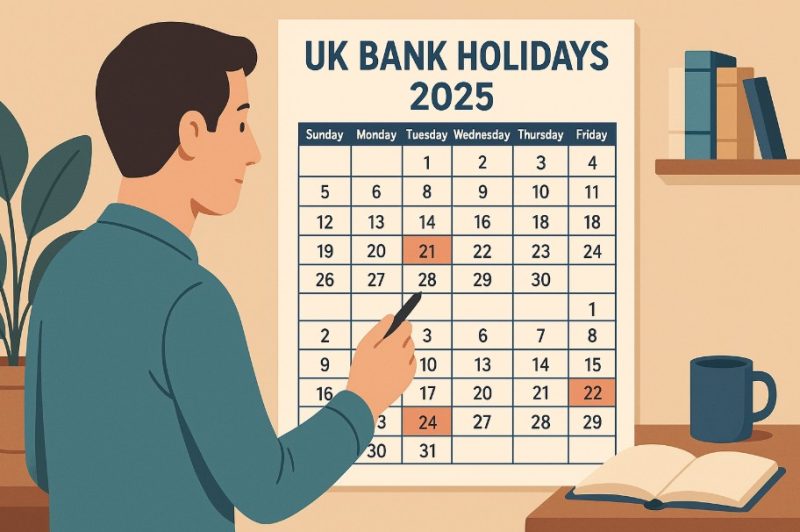Planning your year around the official UK bank holidays in 2025 can help you maximise your downtime, schedule holidays wisely, and achieve a better work-life balance.
Whether you’re an employee looking to stretch your annual leave or a business owner managing team schedules, understanding the holiday calendar is essential.
With dates varying slightly between England, Scotland, Wales, and Northern Ireland, staying informed will help avoid confusion and enhance your productivity.
This comprehensive guide outlines every UK bank holiday for 2025, including substitute days, long weekends, and strategic leave planning.
Let’s dive into the full list and explore how you can make the most of your time off this year.
What Are the Official UK Bank Holidays for 2025?

Bank holidays are spread throughout the calendar and give people time to rest, celebrate or travel. In 2025, the UK has various holidays depending on the region.
While most of them are standard nationwide, some are exclusive to certain countries within the UK.
Official Bank Holidays in the UK for 2025
| Date | Day | Holiday | Region |
| 1 January | Wednesday | New Year’s Day | UK-wide |
| 18 April | Friday | Good Friday | UK-wide |
| 21 April | Monday | Easter Monday | England, Wales, NI |
| 5 May | Monday | Early May Bank Holiday | UK-wide |
| 26 May | Monday | Spring Bank Holiday | UK-wide |
| 25 August | Monday | Summer Bank Holiday | UK-wide |
| 25 December | Thursday | Christmas Day | UK-wide |
| 26 December | Friday | Boxing Day | UK-wide |
Whether you’re planning a getaway or simply looking forward to a break, these dates can help you make the most of your time off.
Mark your calendar early to avoid last-minute surprises. UK bank holidays are a perfect way to balance work and relaxation throughout the year.
How Do Bank Holidays Differ Across England, Scotland, Wales, and Northern Ireland?
Bank holidays differ slightly in each part of the UK, reflecting the unique traditions and legislation of the individual nations.
Bank Holidays for England and Wales
| Date | Holiday |
| 1 January | New Year’s Day |
| 18 April | Good Friday |
| 21 April | Easter Monday |
| 5 May | Early May Bank Holiday |
| 26 May | Spring Bank Holiday |
| 25 August | Summer Bank Holiday |
| 25 December | Christmas Day |
| 26 December | Boxing Day |
Bank Holidays for Scotland
| Date | Holiday |
| 1 January | New Year’s Day |
| 2 January | 2nd January Holiday |
| 18 April | Good Friday |
| 5 May | Early May Bank Holiday |
| 26 May | Spring Bank Holiday |
| 4 August | Summer Bank Holiday |
| 1 December | St. Andrew’s Day (Substitute) |
| 25 December | Christmas Day |
| 26 December | Boxing Day |
Bank Holidays for Northern Ireland
| Date | Holiday |
| 1 January | New Year’s Day |
| 17 March | St Patrick’s Day |
| 18 April | Good Friday |
| 21 April | Easter Monday |
| 5 May | Early May Bank Holiday |
| 26 May | Spring Bank Holiday |
| 14 July | Battle of the Boyne (Sub.) |
| 25 August | Summer Bank Holiday |
| 25 December | Christmas Day |
| 26 December | Boxing Day |
Understanding regional differences helps with better travel and work planning, especially for cross-border activities.
While many holidays are shared, each nation celebrates unique traditions. Always check your local calendar to ensure you don’t miss an important day off.
When Are the Long Weekends in the UK in 2025?

Long weekends provide a great opportunity to relax, travel or spend time with family and friends. In 2025, the UK will enjoy several extended weekends thanks to bank holidays falling on or around weekends or Mondays. These include:
- 18–21 April: Good Friday to Easter Monday
- 3–5 May: Early May Bank Holiday weekend
- 24–26 May: Spring Bank Holiday weekend
- 23–25 August: Summer Bank Holiday weekend
- 25–28 December: Christmas to Boxing Day followed by weekend
Using these long weekends wisely can offer excellent travel and rest opportunities. Plan early to avoid price hikes and availability issues during peak periods.
Do Most UK Bank Holidays Fall on a Monday?
Yes, the majority of UK bank holidays fall on a Monday, which is an intentional scheduling choice designed to give workers three-day weekends.
This pattern provides consistent and predictable breaks throughout the year, helping people unwind and spend more time with family or enjoy leisure activities without affecting midweek productivity.
In 2025, major holidays such as the Early May Bank Holiday, Spring Bank Holiday, and Summer Bank Holiday all fall on Mondays, continuing this well-established tradition.
When a fixed-date holiday, like Christmas Day or New Year’s Day, falls on a weekend, the following Monday (or nearest working day) is designated as a substitute day.
This approach ensures employees don’t lose a day off due to the holiday coinciding with the weekend. Known as the substitute day rule, it makes planning smoother for individuals and businesses alike.
Monday bank holidays are especially convenient for arranging short breaks, events, or family activities without interrupting the normal work schedule.
What is the Difference Between Bank Holidays and Public Holidays?
Although often used interchangeably, there are differences between bank holidays and public holidays in the UK.
- Bank Holidays: These are holidays declared by the UK government or royal proclamation. They are recognised by banks, schools, and most workplaces.
- Public Holidays: A broader term that includes bank holidays but also covers national observances, some of which might not be days off for everyone.
Key Differences
- Scope: All bank holidays are public holidays, but not all public holidays are bank holidays.
- Employment Rights: Employers are not legally required to give time off on public holidays unless it is included in your contract.
- Regional Variations: Some public holidays are region-specific and may not be bank holidays in other areas of the UK.
Examples
- St. Patrick’s Day is a public and bank holiday in Northern Ireland.
- St. Andrew’s Day is a bank holiday in Scotland but not in England.
In general, the UK recognises eight standard bank holidays, but variations exist across regions and businesses.
How Will the 2025 Bank Holidays Affect Work and Business in the UK?

Bank holidays play a significant role in workplace planning and productivity. For businesses, these days can be both a blessing and a challenge depending on industry and staffing levels.
Business Impacts
- Reduced Operating Hours: Many businesses close or operate limited hours, especially in retail and customer service sectors.
- Payroll Considerations: Employees may be entitled to extra pay or time off in lieu if they work on a bank holiday.
- Holiday Leave Management: HR departments must plan annual leave carefully to ensure sufficient cover.
Work Impacts
- Project Delays: Timelines may shift if bank holidays disrupt workflow or service delivery.
- Client Expectations: Customer service response times may be slower during holiday periods.
- Boost to Hospitality & Travel: Long weekends typically increase bookings and sales in leisure industries.
Businesses should prepare ahead by clearly communicating holiday policies and managing workloads efficiently.
Are There Any Substitute Days for Bank Holidays in 2025?
Yes, the UK follows a substitute day policy when a bank holiday falls on a weekend, allowing it to be observed on the next available working day, typically Monday.
This ensures that people still benefit from their entitled day off, even if the official holiday coincides with Saturday or Sunday. This rule maintains fairness and consistency across employment sectors.
In 2025, most key holidays fall on weekdays, so few substitute days are needed. For instance, Christmas Day (25 December) falls on a Thursday, and Boxing Day (26 December) lands on a Friday, so no substitution is required. Similarly, New Year’s Day (1 January) is on a Wednesday, which also doesn’t warrant a shift.
However, in Scotland, St Andrew’s Day falls on Sunday, 30 November, so it will be observed on Monday, 1 December.
In Northern Ireland, the Battle of the Boyne, usually on 13 July, falls on a Sunday and will be observed on Monday, 14 July. These substitute days help maintain uniformity across different parts of the UK.
What’s the Best Way to Use Your Annual Leave Around Bank Holidays?

Strategically combining your annual leave with bank holidays can help you enjoy longer breaks while using fewer leave days. Here’s how you can optimise your time off in 2025.
Top Tips
- Easter Break: Take 4 days off between 22–25 April, and enjoy 10 days off including the long weekend.
- Early May Holiday: Book 4–7 May off to get a 9-day break.
- Spring Bank Holiday: Combine 27–30 May for another 9-day stretch.
- Christmas Break: Take leave from 22–24 December and enjoy 12 days off including weekends and holidays.
Planning Advice
- Book Early: Popular dates get snapped up fast, especially around school holidays.
- Coordinate with Team: Ensure you don’t overlap with critical projects or other team members.
- Use Leave for Wellbeing: Take time off for mental health or family commitments, not just trips.
By planning smartly around UK bank holidays, you can make the most of your statutory holiday entitlements and enhance your overall wellbeing.
Conclusion
Knowing your UK bank holidays in 2025 is essential whether you’re managing your team’s work schedules or planning your next getaway.
With regional differences in dates and a range of substitute days to consider, it’s helpful to refer to official and updated calendars like GOV.UK.
From long weekends to extended holiday breaks, these key dates offer opportunities to recharge and spend quality time with loved ones.
Whether you live in England, Scotland, Wales or Northern Ireland, being proactive with your calendar ensures you won’t miss out on those vital rest days.
Make the most of these holidays by aligning them with your annual leave and start your 2025 with better planning, balance, and well-earned relaxation.
FAQs About UK Bank Holidays 2025
How many bank holidays are there in the UK in 2025?
There are eight standard bank holidays across most of the UK in 2025. Scotland and Northern Ireland have additional holidays unique to their regions.
Do UK bank holidays apply to everyone in the country?
Not necessarily. Bank holiday entitlements depend on your employment contract and workplace policies.
Can employers refuse time off on bank holidays?
Yes, employers can refuse time off if the employment contract allows it. However, many workplaces include bank holidays as part of annual leave entitlements.
Are schools closed during UK bank holidays?
Yes, most schools are closed on bank holidays. However, always check with the local education authority for specific closures.
What happens if I work on a bank holiday in the UK?
Employees working on bank holidays are usually compensated with extra pay or time off in lieu. This varies based on company policy.
Are UK bank holidays the same every year?
No, dates shift slightly each year depending on calendar alignment. Some holidays also move based on religious or traditional observances.
Do UK bank holidays affect public transport or postal services?
Yes, services often run on reduced schedules or may be unavailable. It’s advisable to check timetables in advance during holidays.







